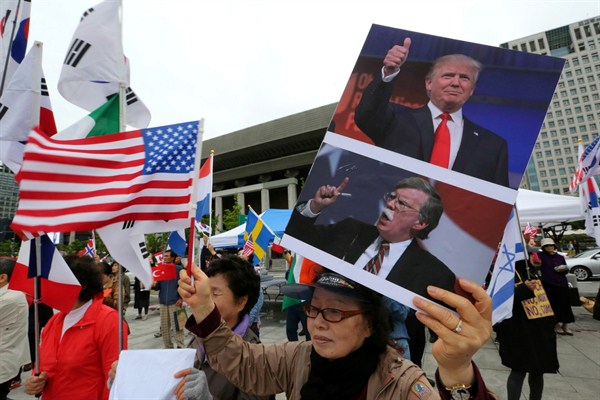SEOUL—Without knowing how many plot twists are left in U.S. President Donald Trump’s attempt to engage with North Korean leader Kim Jong Un, it’s hard to know if the play will end up being a tragedy, a comedy or a satirical farce. The audacity of Trump’s belief that he can transform the Korean Peninsula into a denuclearized zone of peace in mere weeks is matched by his inability or unwillingness to master the historical issues and complex constraints that have so far kept the parties from achieving the breakthrough he seeks.
One of the reasons the plot keeps changing is the administration’s unhelpful use of analogies to other policy interventions that sought to reduce or prevent nuclear dangers, particularly in Libya and Iran. The Libya analogy invoked by Vice President Mike Pence and Trump’s national security adviser, John Bolton, ostensibly offended Kim last week, triggering the sequence of events that culminated—for now—in Trump’s letter calling off the summit. So it seemed, anyway. It may have all been staged to reassert Trump’s control of the narrative, after Kim’s trip to Beijing to meet with Chinese President Xi Jinping left Trump feeling he needed to establish his primacy in this courtship.
In any event, referring to the denuclearization of Libya is analytically quite unhelpful because the cases are so different, and doing so could well have the opposite effect on the North Korean leader than intended by those who love to mention it. Libya in 2003 was at the early stages of procuring the inputs to a nuclear program that it unconditionally agreed to dismantle. And for an insecure leader like Kim, the long-term outcome of that decision for former Libyan leader Moammar Gadhafi only underscores the folly of giving up a strategic asset when the great powers are taunting you with threats of regime change. An American audience may have liked the reassuring effectiveness of the Libya model’s outcome; the North Koreans focused on Gadhafi’s vulnerability once he gave up his program, culminating in the U.S.-assisted campaign to oust him in 2011. Kim and company may have also been insulted by the comparison, since they are light years ahead of where the Libyans were when Gadhafi agreed to shutter his program.

